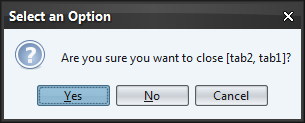|
Sample code |
The following example registers a tab close listener on the specific
tabbed pane. The listener listens on single tab close events:
import java.awt.BorderLayout;
import java.awt.Component;
import javax.swing.*;
import org.pushingpixels.substance.api.SubstanceLookAndFeel;
import org.pushingpixels.substance.api.skin.BusinessBlackSteelSkin;
import org.pushingpixels.substance.api.tabbed.TabCloseListener;
/**
* Test application that shows the use of the
* {@link SubstanceLookAndFeel#registerTabCloseChangeListener(JTabbedPane, org.pushingpixels.substance.tabbed.BaseTabCloseListener)}
* API with registering a tab close listener that listens on single tab closing
* on a specific tabbed pane.
*
* @author Kirill Grouchnikov
* @see SubstanceLookAndFeel#registerTabCloseChangeListener(JTabbedPane,
* org.pushingpixels.substance.tabbed.BaseTabCloseListener)
*/
public class RegisterTabCloseChangeListener_SpecificSingle extends JFrame {
/**
* Creates the main frame for <code>this</code> sample.
*/
public RegisterTabCloseChangeListener_SpecificSingle() {
super("Register tab close listener");
this.setLayout(new BorderLayout());
JTabbedPane jtp = new JTabbedPane();
jtp.addTab("tab1", new JPanel());
jtp.addTab("tab2", new JPanel());
jtp.addTab("tab3", new JPanel());
jtp.putClientProperty(
SubstanceLookAndFeel.TABBED_PANE_CLOSE_BUTTONS_PROPERTY,
Boolean.TRUE);
// register tab close listener on the specific tabbed pane.
SubstanceLookAndFeel.registerTabCloseChangeListener(jtp,
new TabCloseListener() {
public void tabClosing(JTabbedPane tabbedPane,
Component tabComponent) {
System.out.println("Tab "
+ tabbedPane.getTitleAt(tabbedPane
.indexOfComponent(tabComponent))
+ " closing");
}
public void tabClosed(JTabbedPane tabbedPane,
Component tabComponent) {
System.out.println("Tab closed");
}
});
this.add(jtp, BorderLayout.CENTER);
this.setSize(400, 200);
this.setLocationRelativeTo(null);
this.setDefaultCloseOperation(JFrame.EXIT_ON_CLOSE);
}
/**
* The main method for <code>this</code> sample. The arguments are ignored.
*
* @param args
* Ignored.
*/
public static void main(String[] args) {
JFrame.setDefaultLookAndFeelDecorated(true);
SwingUtilities.invokeLater(new Runnable() {
public void run() {
SubstanceLookAndFeel.setSkin(new BusinessBlackSteelSkin());
new RegisterTabCloseChangeListener_SpecificSingle()
.setVisible(true);
}
});
}
}
Running the example above and clicking the close button of the third
tab produce the following output:
Tab tab3 closing
Tab closed
The following example registers a tab close listener on the specific
tabbed pane. The listener listens on single tab close events and vetoes them:
import java.awt.BorderLayout;
import java.awt.Component;
import javax.swing.*;
import org.pushingpixels.substance.api.SubstanceLookAndFeel;
import org.pushingpixels.substance.api.skin.BusinessBlackSteelSkin;
import org.pushingpixels.substance.api.tabbed.VetoableTabCloseListener;
/**
* Test application that shows the use of the
* {@link SubstanceLookAndFeel#registerTabCloseChangeListener(JTabbedPane, org.pushingpixels.substance.tabbed.BaseTabCloseListener)}
* API with registering a vetoable tab close listener that listens on single tab
* closing on a specific tabbed pane.
*
* @author Kirill Grouchnikov
* @see SubstanceLookAndFeel#registerTabCloseChangeListener(JTabbedPane,
* org.pushingpixels.substance.tabbed.BaseTabCloseListener)
*/
public class RegisterTabCloseChangeListener_SpecificSingleVetoable extends
JFrame {
/**
* Creates the main frame for <code>this</code> sample.
*/
public RegisterTabCloseChangeListener_SpecificSingleVetoable() {
super("Register tab close listener");
this.setLayout(new BorderLayout());
JTabbedPane jtp = new JTabbedPane();
jtp.addTab("tab1", new JPanel());
jtp.addTab("tab2", new JPanel());
jtp.addTab("tab3", new JPanel());
jtp.putClientProperty(
SubstanceLookAndFeel.TABBED_PANE_CLOSE_BUTTONS_PROPERTY,
Boolean.TRUE);
// register tab close listener on the specific tabbed pane.
SubstanceLookAndFeel.registerTabCloseChangeListener(jtp,
new VetoableTabCloseListener() {
public void tabClosing(JTabbedPane tabbedPane,
Component tabComponent) {
System.out.println("Tab "
+ tabbedPane.getTitleAt(tabbedPane
.indexOfComponent(tabComponent))
+ " closing");
}
public void tabClosed(JTabbedPane tabbedPane,
Component tabComponent) {
System.out.println("Tab closed");
}
public boolean vetoTabClosing(JTabbedPane tabbedPane,
Component tabComponent) {
return (JOptionPane
.showConfirmDialog(
RegisterTabCloseChangeListener_SpecificSingleVetoable.this,
"Are you sure you want to close "
+ tabbedPane
.getTitleAt(tabbedPane
.indexOfComponent(tabComponent))
+ "?") != JOptionPane.YES_OPTION);
}
});
this.add(jtp, BorderLayout.CENTER);
this.setSize(400, 200);
this.setLocationRelativeTo(null);
this.setDefaultCloseOperation(JFrame.EXIT_ON_CLOSE);
}
/**
* The main method for <code>this</code> sample. The arguments are ignored.
*
* @param args
* Ignored.
*/
public static void main(String[] args) {
JFrame.setDefaultLookAndFeelDecorated(true);
JDialog.setDefaultLookAndFeelDecorated(true);
SwingUtilities.invokeLater(new Runnable() {
public void run() {
SubstanceLookAndFeel.setSkin(new BusinessBlackSteelSkin());
new RegisterTabCloseChangeListener_SpecificSingleVetoable()
.setVisible(true);
}
});
}
}
Running the example above and clicking the close button of the third
tab shows the following dialog:

Clicking "No" or "Cancel" dismisses the dialog and vetoes the tab closing. Pressing
"Yes" dismisses the dialog, closes the tab and produces the following output:
Tab tab3 closing
Tab closed
The following example registers a tab close listener on the specific tabbed
pane. The listener listens on multiple tab close events:
import java.awt.BorderLayout;
import java.awt.Component;
import java.awt.event.MouseEvent;
import java.util.Set;
import javax.swing.*;
import org.pushingpixels.substance.api.SubstanceLookAndFeel;
import org.pushingpixels.substance.api.SubstanceConstants.TabCloseKind;
import org.pushingpixels.substance.api.skin.BusinessBlackSteelSkin;
import org.pushingpixels.substance.api.tabbed.MultipleTabCloseListener;
import org.pushingpixels.substance.api.tabbed.TabCloseCallback;
/**
* Test application that shows the use of the
* {@link SubstanceLookAndFeel#registerTabCloseChangeListener(JTabbedPane, org.pushingpixels.substance.tabbed.BaseTabCloseListener)}
* API with registering a tab close listener that listens on multiple tab
* closing on a specific tabbed pane.
*
* @author Kirill Grouchnikov
* @see SubstanceLookAndFeel#registerTabCloseChangeListener(JTabbedPane,
* org.pushingpixels.substance.tabbed.BaseTabCloseListener)
*/
public class RegisterTabCloseChangeListener_SpecificMultiple extends JFrame {
/**
* Creates the main frame for <code>this</code> sample.
*/
public RegisterTabCloseChangeListener_SpecificMultiple() {
super("Register tab close listener");
this.setLayout(new BorderLayout());
JTabbedPane jtp = new JTabbedPane();
jtp.addTab("tab1", new JPanel());
jtp.addTab("tab2", new JPanel());
jtp.addTab("tab3", new JPanel());
jtp.putClientProperty(
SubstanceLookAndFeel.TABBED_PANE_CLOSE_BUTTONS_PROPERTY,
Boolean.TRUE);
// create a custom implementation of TabCloseCallback interface.
TabCloseCallback closeCallback = new TabCloseCallback() {
public TabCloseKind onAreaClick(JTabbedPane tabbedPane,
int tabIndex, MouseEvent mouseEvent) {
if (mouseEvent.getButton() != MouseEvent.BUTTON3)
return TabCloseKind.NONE;
if (mouseEvent.isShiftDown()) {
return TabCloseKind.ALL;
}
return TabCloseKind.THIS;
}
public TabCloseKind onCloseButtonClick(JTabbedPane tabbedPane,
int tabIndex, MouseEvent mouseEvent) {
if (mouseEvent.isAltDown()) {
return TabCloseKind.ALL_BUT_THIS;
}
if (mouseEvent.isShiftDown()) {
return TabCloseKind.ALL;
}
return TabCloseKind.THIS;
}
public String getAreaTooltip(JTabbedPane tabbedPane, int tabIndex) {
return null;
}
public String getCloseButtonTooltip(JTabbedPane tabbedPane,
int tabIndex) {
StringBuffer result = new StringBuffer();
result.append("<html><body>");
result.append("Mouse click closes <b>"
+ tabbedPane.getTitleAt(tabIndex) + "</b> tab");
result
.append("<br><b>Alt</b>-Mouse click closes all tabs but <b>"
+ tabbedPane.getTitleAt(tabIndex) + "</b> tab");
result.append("<br><b>Shift</b>-Mouse click closes all tabs");
result.append("</body></html>");
return result.toString();
}
};
// register the callback on the tabbed pane
jtp.putClientProperty(SubstanceLookAndFeel.TABBED_PANE_CLOSE_CALLBACK,
closeCallback);
// register tab close listener on the specific tabbed pane.
SubstanceLookAndFeel.registerTabCloseChangeListener(jtp,
new MultipleTabCloseListener() {
public void tabsClosing(JTabbedPane tabbedPane,
Set<Component> tabComponents) {
StringBuffer sb = new StringBuffer("Tab (s)");
String sep = " [";
for (Component comp : tabComponents) {
sb.append(sep);
sep = ", ";
sb.append(tabbedPane.getTitleAt(tabbedPane
.indexOfComponent(comp)));
}
sb.append("] closing");
System.out.println(sb.toString());
}
public void tabsClosed(JTabbedPane tabbedPane,
Set<Component> tabComponents) {
System.out.println(tabComponents.size()
+ " tab(s) closed");
}
});
this.add(jtp, BorderLayout.CENTER);
this.setSize(400, 200);
this.setLocationRelativeTo(null);
this.setDefaultCloseOperation(JFrame.EXIT_ON_CLOSE);
}
/**
* The main method for <code>this</code> sample. The arguments are ignored.
*
* @param args
* Ignored.
*/
public static void main(String[] args) {
JFrame.setDefaultLookAndFeelDecorated(true);
SwingUtilities.invokeLater(new Runnable() {
public void run() {
SubstanceLookAndFeel.setSkin(new BusinessBlackSteelSkin());
new RegisterTabCloseChangeListener_SpecificMultiple()
.setVisible(true);
}
});
}
}
Running the example above and Alt-clicking the close button of the third
tab produce the following output:
Tab (s) [tab1, tab2] closing
2 tab(s) closed
The following example registers a tab close listener on the specific tabbed
pane. The listener listens on multiple tab close events and vetoes them:
import java.awt.BorderLayout;
import java.awt.Component;
import java.awt.event.MouseEvent;
import java.util.Set;
import javax.swing.*;
import org.pushingpixels.substance.api.SubstanceLookAndFeel;
import org.pushingpixels.substance.api.SubstanceConstants.TabCloseKind;
import org.pushingpixels.substance.api.skin.BusinessBlackSteelSkin;
import org.pushingpixels.substance.api.tabbed.TabCloseCallback;
import org.pushingpixels.substance.api.tabbed.VetoableMultipleTabCloseListener;
/**
* Test application that shows the use of the
* {@link SubstanceLookAndFeel#registerTabCloseChangeListener(JTabbedPane, org.pushingpixels.substance.tabbed.BaseTabCloseListener)}
* API with registering a vetoable tab close listener that listens on multiple
* tab closing on a specific tabbed pane.
*
* @author Kirill Grouchnikov
* @see SubstanceLookAndFeel#registerTabCloseChangeListener(JTabbedPane,
* org.pushingpixels.substance.tabbed.BaseTabCloseListener)
*/
public class RegisterTabCloseChangeListener_SpecificMultipleVetoable extends
JFrame {
/**
* Creates the main frame for <code>this</code> sample.
*/
public RegisterTabCloseChangeListener_SpecificMultipleVetoable() {
super("Register tab close listener");
this.setLayout(new BorderLayout());
JTabbedPane jtp = new JTabbedPane();
jtp.addTab("tab1", new JPanel());
jtp.addTab("tab2", new JPanel());
jtp.addTab("tab3", new JPanel());
jtp.putClientProperty(
SubstanceLookAndFeel.TABBED_PANE_CLOSE_BUTTONS_PROPERTY,
Boolean.TRUE);
// create a custom implementation of TabCloseCallback interface.
TabCloseCallback closeCallback = new TabCloseCallback() {
public TabCloseKind onAreaClick(JTabbedPane tabbedPane,
int tabIndex, MouseEvent mouseEvent) {
if (mouseEvent.getButton() != MouseEvent.BUTTON3)
return TabCloseKind.NONE;
if (mouseEvent.isShiftDown()) {
return TabCloseKind.ALL;
}
return TabCloseKind.THIS;
}
public TabCloseKind onCloseButtonClick(JTabbedPane tabbedPane,
int tabIndex, MouseEvent mouseEvent) {
if (mouseEvent.isAltDown()) {
return TabCloseKind.ALL_BUT_THIS;
}
if (mouseEvent.isShiftDown()) {
return TabCloseKind.ALL;
}
return TabCloseKind.THIS;
}
public String getAreaTooltip(JTabbedPane tabbedPane, int tabIndex) {
return null;
}
public String getCloseButtonTooltip(JTabbedPane tabbedPane,
int tabIndex) {
StringBuffer result = new StringBuffer();
result.append("<html><body>");
result.append("Mouse click closes <b>"
+ tabbedPane.getTitleAt(tabIndex) + "</b> tab");
result
.append("<br><b>Alt</b>-Mouse click closes all tabs but <b>"
+ tabbedPane.getTitleAt(tabIndex) + "</b> tab");
result.append("<br><b>Shift</b>-Mouse click closes all tabs");
result.append("</body></html>");
return result.toString();
}
};
// register the callback on the tabbed pane
jtp.putClientProperty(SubstanceLookAndFeel.TABBED_PANE_CLOSE_CALLBACK,
closeCallback);
// register tab close listener on the specific tabbed pane.
SubstanceLookAndFeel.registerTabCloseChangeListener(jtp,
new VetoableMultipleTabCloseListener() {
public void tabsClosing(JTabbedPane tabbedPane,
Set<Component> tabComponents) {
StringBuffer sb = new StringBuffer("Tab (s)");
String sep = " [";
for (Component comp : tabComponents) {
sb.append(sep);
sep = ", ";
sb.append(tabbedPane.getTitleAt(tabbedPane
.indexOfComponent(comp)));
}
sb.append("] closing");
System.out.println(sb.toString());
}
public void tabsClosed(JTabbedPane tabbedPane,
Set<Component> tabComponents) {
System.out.println(tabComponents.size()
+ " tab(s) closed");
}
public boolean vetoTabsClosing(JTabbedPane tabbedPane,
Set<Component> tabComponents) {
StringBuffer sb = new StringBuffer("");
String sep = "[";
for (Component comp : tabComponents) {
sb.append(sep);
sep = ", ";
sb.append(tabbedPane.getTitleAt(tabbedPane
.indexOfComponent(comp)));
}
sb.append("]");
return (JOptionPane
.showConfirmDialog(
RegisterTabCloseChangeListener_SpecificMultipleVetoable.this,
"Are you sure you want to close "
+ sb.toString() + "?") != JOptionPane.YES_OPTION);
}
});
this.add(jtp, BorderLayout.CENTER);
this.setSize(400, 200);
this.setLocationRelativeTo(null);
this.setDefaultCloseOperation(JFrame.EXIT_ON_CLOSE);
}
/**
* The main method for <code>this</code> sample. The arguments are ignored.
*
* @param args
* Ignored.
*/
public static void main(String[] args) {
JFrame.setDefaultLookAndFeelDecorated(true);
JDialog.setDefaultLookAndFeelDecorated(true);
SwingUtilities.invokeLater(new Runnable() {
public void run() {
SubstanceLookAndFeel.setSkin(new BusinessBlackSteelSkin());
new RegisterTabCloseChangeListener_SpecificMultipleVetoable()
.setVisible(true);
}
});
}
}
Running the example above and Alt-clicking the close button of the third
tab shows the following dialog:

Clicking "No" or "Cancel" dismisses the dialog and vetoes the tab closing. Pressing
"Yes" dismisses the dialog, closes the first and second tabs and produces the following output:
Tab (s) [tab2, tab1] closing
2 tab(s) closed
|
![]() View all API methods.
View all API methods.
![]() View all client properties.
View all client properties.

